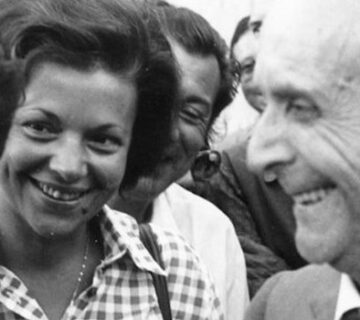Born 1894 into a poor, profoundly Catholic family in Tivoli, Igino Giordani’s parents could not guarantee regular schooling and worked in manual labour. But the young Igino was noted for his intelligence, and a rich gentleman for whom he worked, impressed by his acumen paid for him to study at the seminary, not to become a priest but to be one of the most brilliant diplomats at that time. As he finished his studies the First World War broke out and he went to the trenches. He never fired a shot against his enemies, because Christianity forbade murder. As a result of this brave choice he was gravely wounded. Whilst he was in the military hospitals he graduated in Literature and Philosophy.
He married in 1920. He and his wife Mya had 4 children, and he began working for the newly formed Italian Christian political party, founded by Luigi Sturzo. The Fascist regime destroyed freedom and rights, and even Igino was persecuted. From this period there remain some of his famous writings denouncing fascist violence. On returning to Italy from a journey to the United States he became the director of part of the Vatican Library. From there he also directed the journal ‘Fides’, which was known in Catholic environments throughout the world. It was through them that the re-birth of a post-fascism Catholic political party came about, Christian Democracy. He was elected to Parliament in the first elections after the Second World War.
1948 was the decisive year of his life: he was 54, and a man established in politics and culture. He met Chiara Lubich, a young woman aged 28, in whom he found extraordinary spiritual inspiration. He adhered fully to the Focolare Movement and at Chiara’s side he took on an important role building the Movement and deepening its social doctrine, to the point of often being designated by Chiara as co-founder.
Of special note, the deep spiritual relationship with Chiara was the start of the intense mystical period known as “Paradise ‘49”. From then Chiara clearly saw through Giordani’s life confirmation that the ideal of unity was made for all, and was a gift for the whole of humanity. Igino was the first married focolarino of the Focolare Movement.
Due to some courageous political decisions (pacifism and unity in spite of the ideological differences, or because of them), in Parliament, he became considered as a Christian Democrat out of step, and as a result was not re-elected. This was the time to dedicate himself more to the Focolare Movement, to contribute to the debate in the Church taking ahead themes that would be understood in the Second Vatican Council (above all concerning the mission of the laity). He became the director of the newly created ‘Citta Nuova’ (1959) magazine, and from 1961 became a director of Centro Uno, a body within the Focolare Movement working within ecumenism. In 1965 he was nominated president of the international institute Mystici Corporis in Loppiano. After the death of his wife and with the agreement of his children, he lived the last seven years of his life in a “Focolare”. He left this earth on 18th April 1980. The process towards his canonisation has begun.
Introduction to the Bibliography
Igino Giordani was an intellectual difficult to label: we cannot describe him as a political thinker or journalist, or studier of ancient Christian literature, or a writer about the lives of saints or history, in the hope of being able to sufficiently express his talents. He was driven by a great passion and was spurred into public life through a wide range of interests. It is said that “for him writing was life”, therefore an understanding of the figure of Giordani could (almost) easily come through analysis of his writings. There are about 100 books and more than 4,000 newspaper articles.
NEW ENGLISH PUBLICATION
A Soul on Fire: a profile of Igino Giordani (1894-1980)
The story of Giordani’s personal journey to God
Paperback: 144 pages
Language: English (translation by Margaret Linard, Australia)
Publisher: Centro Igino Giordani, Focolare Movement.
ISBN-13: 978-0975025215
Copies available from Centro Igino Giordani, email


 Italiano
Italiano Español
Español Français
Français Português
Português


